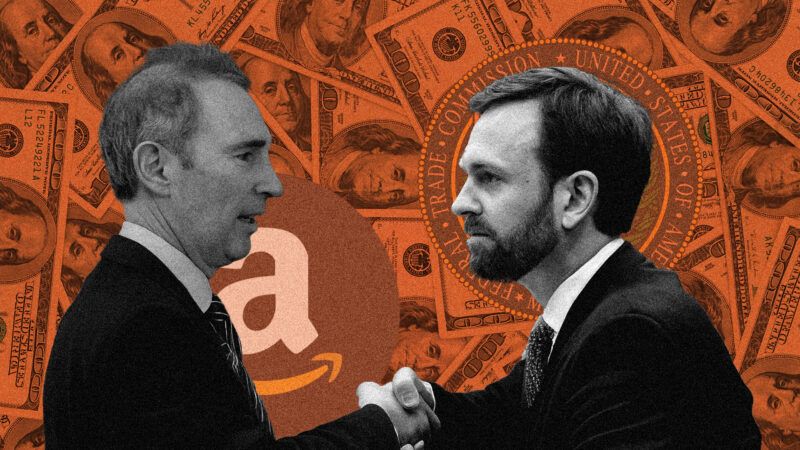Amazon Is Being Forced To Pay $2.5 Billion for Making It Easier To Sign Up for Prime
The Federal Trade Commission reached a settlement with Amazon in its yearslong lawsuit against the company for "dark patterns" in Prime sign up and cancellation.

Before Amazon's multi-billion-dollar settlement with the Federal Trade Commission (FTC) on Thursday, it was anyone's guess how Americans were supposed to know that clicking "No, I don't want free shipping" at checkout really meant "No, I don't want to sign up for Amazon Prime." Fortunately, the FTC has stepped in.
The FTC announced that it had reached a $2.5 billion settlement with Amazon regarding allegations that the company signed up millions of Americans for Prime without their consent. Amazon maintains that it never broke the law and that the settlement will allow it to focus on delivering value for consumers.
The FTC sued Amazon in June 2023, alleging a "years-long effort to enroll consumers into its Prime program without their consent while knowingly making it difficult for consumers to cancel their subscriptions," which the agency had begun investigating more than two years prior. The agency accused Amazon of using "manipulative, coercive, or deceptive user-interface designs known as 'dark patterns' to trick consumers into enrolling in automatically-renewing Prime subscriptions."
The dark patterns alleged include offering consumers "numerous opportunities to subscribe to Amazon Prime at $14.99/month" during the checkout process; making "the option to purchase items on Amazon without subscribing to Prime…more difficult…to locate"; and not clearly stating that, in choosing certain checkout options, users "were also agreeing to join Prime." According to the FTC, Amazon's offering of Prime discounts to consumers before allowing them to cancel their subscription altogether was yet another deceptive practice.
The FTC named the Prime cancellation process "The Iliad Flow," but fails to show how a "six-click, fifteen-option cancellation process" is remotely analogous to Odysseus' 10-year voyage back to Ithaca. An Amazon spokesperson tells Reason that "96% [of customers are] able to cancel in 90 seconds or less." Hardly a herculean feat.
Regardless, the FTC charged Amazon and several of the company's top executives with violating the Restore Online Shoppers' Confidence Act and the FTC Act, which prohibits "unfair or deceptive acts or practices in or affecting commerce." The FTC's investigation discovered documents in which Amazon employees referred to the "shady world" of subscription-driving and the "unspoken cancer" of leading customers to unwanted subscriptions. The same Amazon spokesperson tells Reason, "Amazon and our executives have always followed the law," adding that the company works "incredibly hard to make it clear and simple for customers to both sign up or cancel their Prime membership."
Regardless of Amazon's stated efforts to clarify Prime sign-up and cancellation, the company agreed to the costly settlement. Under the agreement, Amazon will pay $1 billion in civil penalties, $1.5 billion in restitution to the 35 million consumers impacted by unwanted enrollment or deferred cancellation, and the inclusion of "a clear and conspicuous button for customers to decline Prime [and] an easy way for consumers to cancel Prime, using the same method that consumers used to sign up."
FTC Chairman Andrew Ferguson described the settlement as "a monumental win for the millions of Americans who are tired of deceptive subscriptions that feel impossible to cancel." Ferguson, echoing former FTC Chair Lina Khan, blamed Amazon for using "sophisticated subscription traps" and making it "exceedingly hard for consumers to end their subscription."
Forbidding Amazon's non-Prime checkout button from reading, "No, I don't want free shipping," is an implicit indictment of the intellect of the American public. The FTC, under Khan and Ferguson alike, may believe big firms like Amazon are inherently bad, but the American public regarded the company more favorably than any American institution, except for the military, when the FTC began its investigation in 2021.


Show Comments (38)